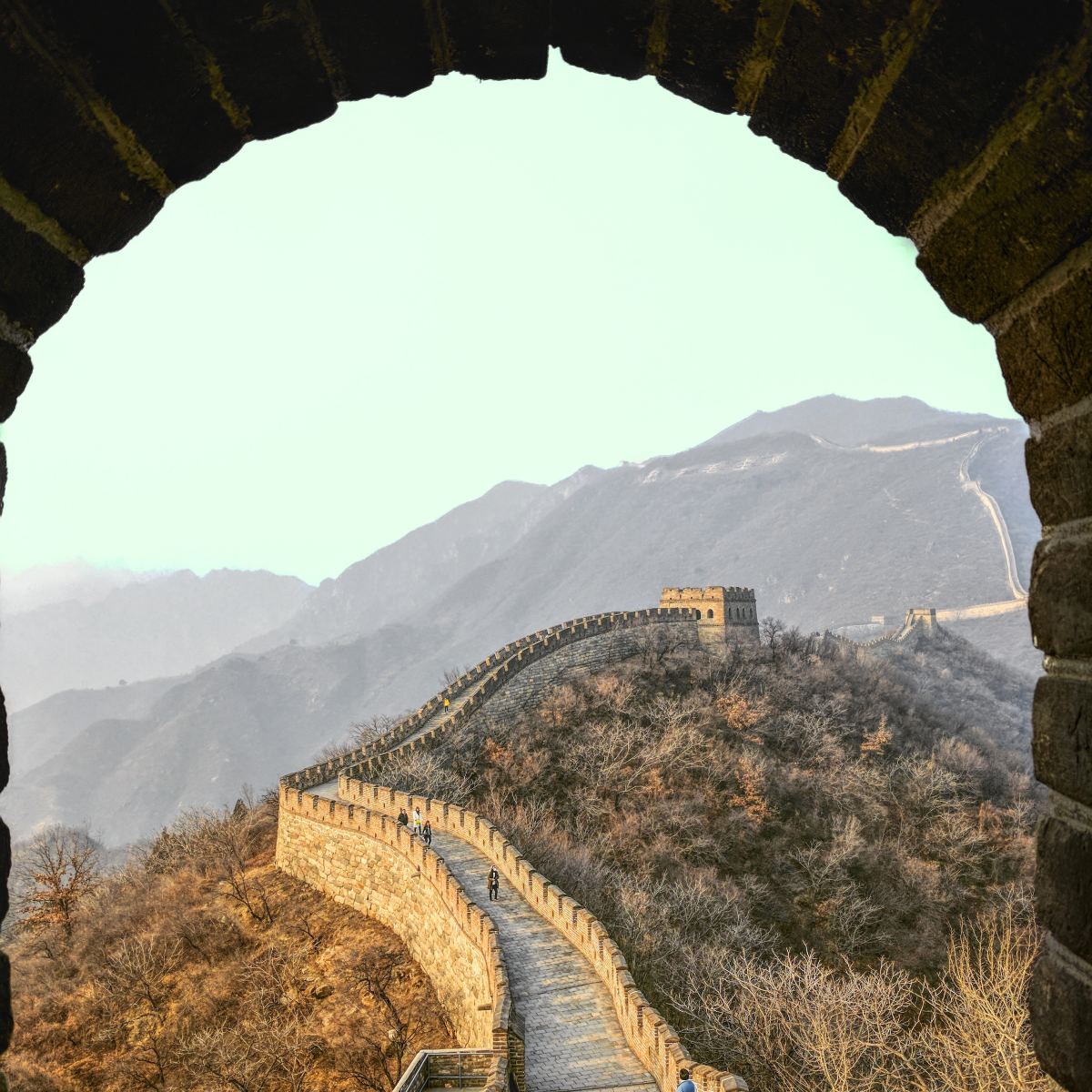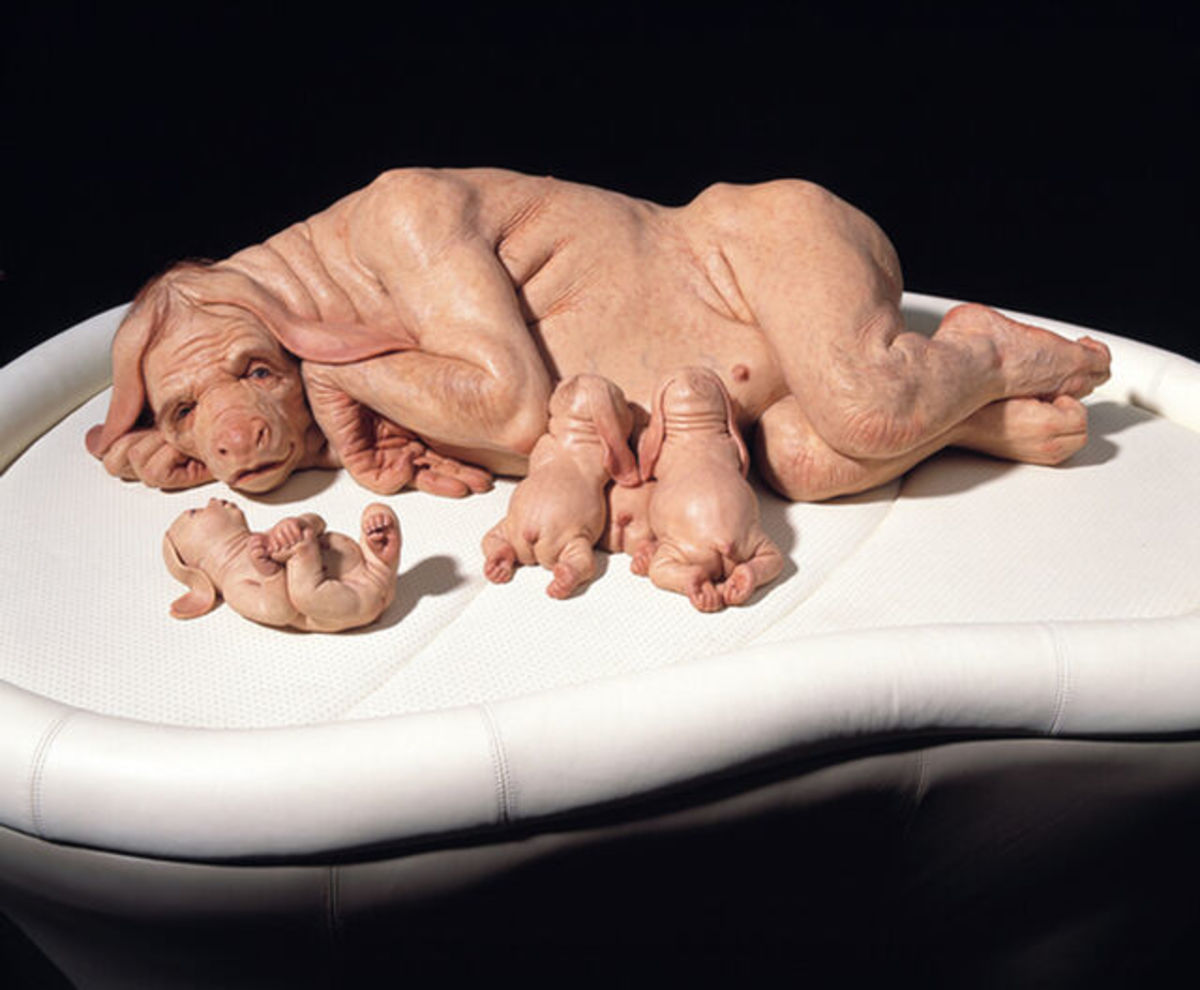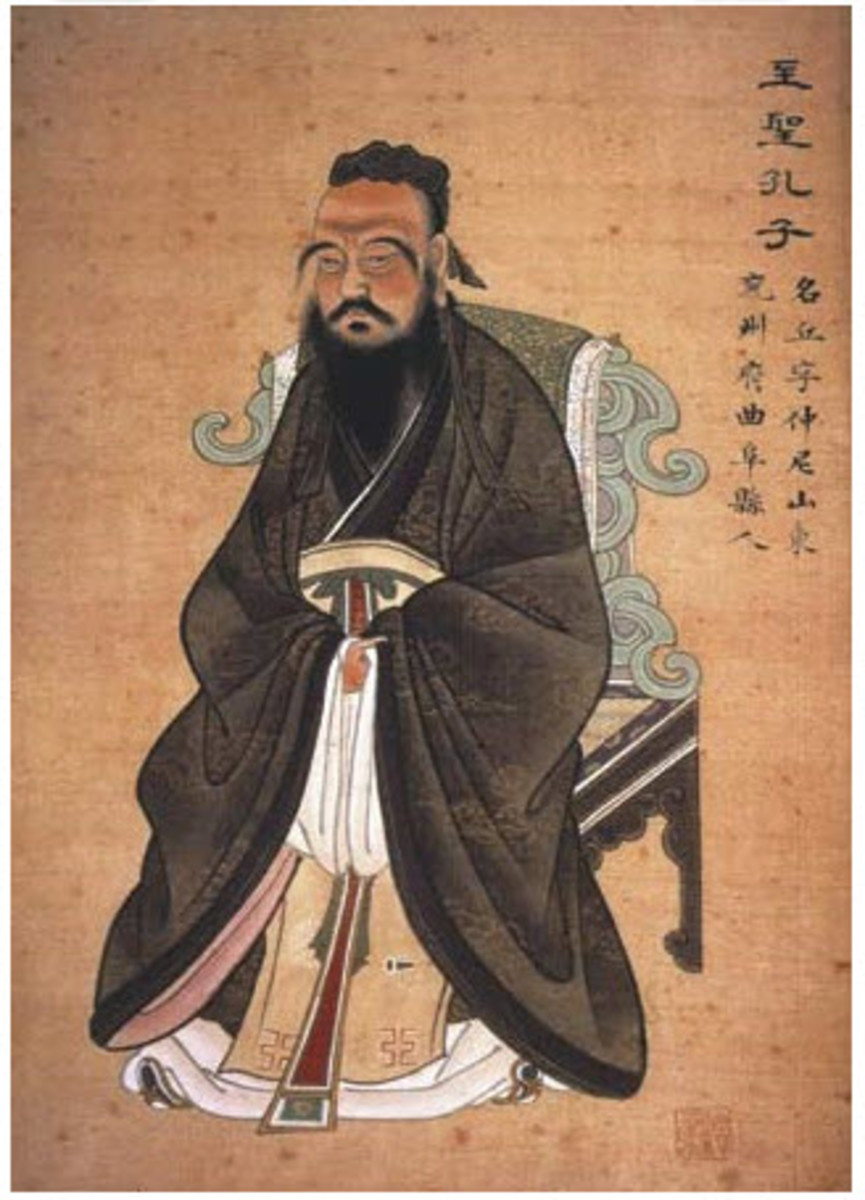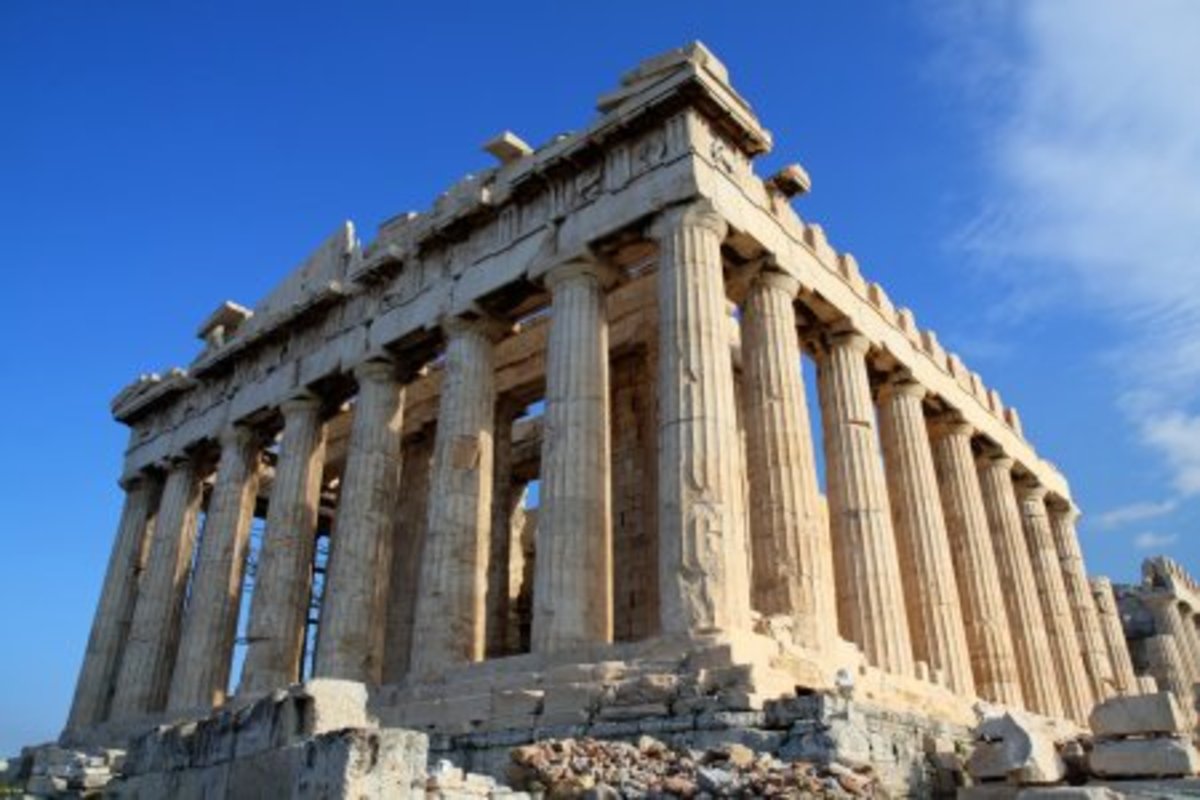Who is Kong Qiu? Master Philosopher, Confucius
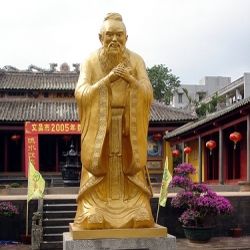
Confucius: Most Famous Philosopher in China's History
Confucius was born in the State of Lu in the last years of the Spring and Autumn Period of the Zhou Dynasty. He was a member of the "Shi" elite, professional administrative class, and spent many years travelling from kingdom to kingdom, offering his services to the many rulers who had broken away from the Zhou.
His ambition to influence the affairs of state failed, so he returned, somewhat dispirited, to the State of Lu to be a teacher. Confucius thought of his life's work as a failure, but his works echo down the centuries even until today!
Image: drs2biz | Lens Updated: June 1st, 2013 @ 12:45 pm Beijing time.
Confucius
Master Philosopher
September 28, 551 to 479 BCE
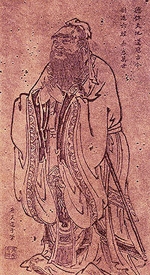
Confucius (Kong Qiu) on Wikipedia!
Check out what the online reference has to say...
Confucius (pinyin: Kong Zi; Wade-Giles: K'ung-tzu, or Chinese pinyin: Kung Fuzi; Wade-Giles: K'ung-fu-tzu), literally "Master Kong, (traditionally September 28, 551 BCE to 479 BCE) was a Chinese thinker and social philosopher.
His philosophy emphasized personal and governmental morality, correctness of social relationships, justice and sincerity. These values gained prominence in China over other doctrines, such as Legalism or Taoism during the Han Dynasty (206 BCE - 220 CE). Confucius' thoughts have been developed into a system of philosophy known as Confucianism. It was introduced to Europe by the Italian Jesuit Matteo Ricci, who ...
Before you embark on a journey of revenge, dig two graves ~ Confucius
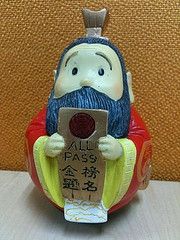
Historical Perspective on the Time of Confucius!
Around the 8th Century BCE, the Zhou Dynasty begins to crumble and it progressively fragments for about two hundred years. The time after this is known as the "Warring States Period" of Chinese history. Smaller states or "kingdoms" begin to appear during what is known as the "Spring and Autumn Period" and, finally, around 500-480 BCE, there is a period when the stronger states absorb the weaker ones. This results in a decline in the overall number from around 250 States down to about a dozen large states, in the 3rd Century BCE, still fighting for superiority. 2
Image: bfishadow, flickr
What you do not want done to yourself, do not do to others ~ Confucius
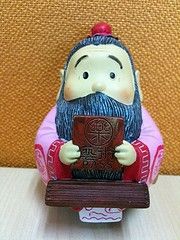
Rise of the Political/Administrative Class, the "Shi"
Considering this historical perspective, let's now look at the philosophical response, the questions that people asked, the way that people tried to make sense of the chaos that appeared around them during this period in China. This is the period of time, in China, of the rise of the "Shi", the class of professional political administrators who emerged during the Spring and Autumn Period as the number of local courts or Royal establishments grew and people were needed to carry on the administrative activities of government. They were the literate class, the group of individuals who read and wrote the records and used the historical precedents of the past to advise their rulers on government policies.
Image: bfishadow, flickr
These individuals reflected on the problems that were confronting the many states that constituted China, and they asked questions about why things had become so difficult. What had gone wrong with the order that had existed - the early Zhou dynasty had been a period of great success, great expansion and growth - why had that gone wrong, why had it broken down? As a corollary of that, what could be done to put the world back into order, what could be done to fix things? There were many responses that different individuals came up with... but let's concentrate on perhaps the most influential figure in Chinese intellectual or philosophical history, and that is Confucius. 3Ignorance is the night of the mind, but a night without moon and star ~ Confucius
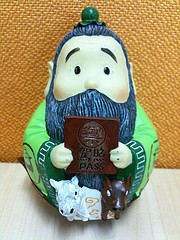
Do We Have Historical Records of Confucius?
Confucius lived between about 550 and 480 BCE. Exact dates are hard to determine. There aren't really any contemporary records about him, but we do have information written down about him by his students, their students and later generations. We know, for example, that he spent a fair amount of time travelling about in Eastern China, essentially offering his services to the rulers of various states. Confucius was from the State of Lu, in what is today Shandong Province. It was a very successful State, one of the more prosperous States that was ruled by a family who could trace its descent back to the Duke of Zhou. That was where Confucius grew up, where he learnt his craft of politics.
Image: bfishadow, flickr
He was a member of the "Shi" elite, the professional administrative class. By this time it was possible for members of the Shi class to not simply serve in the place where they were born, but to offer their services to travel around to different locations, and this is what Confucius did. But he wasn't very successful at it! He never seems to have achieved the kind of position that he was looking for - to really be an influential advisor, to guide the affairs of State, to guide the actions of a ruler. He held a number of relatively minor positions, and eventually he gave up this effort to try to achieve political success through serving an administration. He went back to his home State of Lu, and he settled in to a longer career as a teacher. It's from his role as a teacher that we really know about his ideas, because his students and then later individuals that they passed their ideas on to, wrote down many of the things that he said and talks that he gave. That's all the information that we have about Confucius. 4They must often change who would be constant in happiness or wisdom ~ Confucius
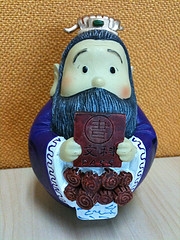
So, What Were Confucius' Teachings All About?
Confucius' teachings, the core of his ideas, are about human relationships. When he looked at the world around him, when he looked at the problems facing China, and he asks these questions about "What went wrong?", "Why are things so messed up?", "What are we going to do to put things back into proper order?" His response was to say "People need to understand the relationships between individuals in society. If we want a well-ordered society, a society in which people can live together peacefully and in prosperity, then we need to recognise that society is a network of human relationships". He saw the family as a sort of microcosm of this.
Image: bfishadow, flickr
The relationships within the family served for Confucius to represent the kinds of relationships that in society were desirable as a whole. They were relationships that, on the one hand, involved obligations, duty, responsibilities and, on the other hand, bonds of affection, compassion and caring. 5Be not ashamed of mistakes and thus make them crimes ~ Confucius
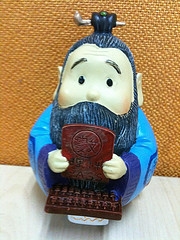
So, What Did He Say About These Relationships?
Confucius defined a set of, what we call, the five (5) great relationships, which were not meant to be an exhaustive catalogue of all possible relationships, but were archetypical. They represented how human relationships worked in general. He defined five concrete examples which served to represent this. These are:
1) The relationship between the ruler and the subject.
2) The relationship between father and son.
3) The relationship between husband and wife.
4) The relationship between elder brother and younger brother.
5) The relationship between friend and friend.
Image: bfishadow, flickr
Three of these are family relationships... 2, 3, and 4 - and this reflects the centrality of the family in Confucian thought. It's not just a coincidence that he chose these three in the overall five relationships. 6Wheresoever you go, go with all your heart ~ Confucius
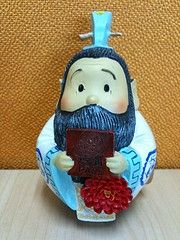
And, So How Do These Relationships Work?
All of these relationships have certain characteristics. They are all hierarchical. That is to say, in each pair, one plays a leading role and the other side plays a following role. One side is dominant and one side is subordinate. The ruler is dominant over the subject. The father has a leading role in guiding, development and control of his son in his subordinate and learning role. The husband and the wife, the elder and younger brother, even in the relationship between friend and friend. This sounds like a more egalitarian relationship, people are just friends but, in Confucius' vision, even in the relationship between friends, there will always be, in any given set of circumstances, one of the two will be senior.
Image: bfishadow, flickr
They may be older, wiser, more sophisticated, a better baseball player - there will be some way in which one of the two plays a more leading role and the other plays the role of "second fiddle", of following along. That isn't to say that, given two individuals, they will always be in the same relationship. It may be that, in one circumstance, friend A is the leader and friend B is the follower. In another set of circumstances, maybe the particular traits of friend B may put him in the leading role and friend A in the following role. But, in any particular situation, there will be a hierarchical relationship. 7He who will not economise will have to agonise ~ Confucius
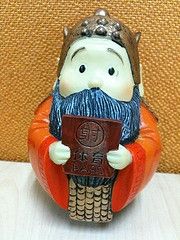
Does Confucius Just Talk About Who's the Boss?
So, these relationships will have a hierarchical dimension. But that's not the totality of them. They also have an aspect of reciprocity, Which is to say they're not just "top down". It isn't just the ruler is the ruler and the subject is the subject and therefore the ruler can do whatever they want and the subject is uniformly obligated to obey. The same applies for the father and the son or the husband and the wife, any relationship. The ruler, or the father, or the husband must be a 'good' ruler, or father or husband. They must fulfil their role in a 'proper' way. They have to 'do the right thing'. If they abuse their role, if they are cruel, exploitive, or negligent, then the subject, the son, the wife is released, in a sense, from the bond of obligation.
Image: bfishadow, flickr
The reciprocity of these relationships is what makes them, in many ways, work. Otherwise, it's just a power thing, it's just a dictatorial exercise. Top-down power may be effective in certain circumstances, it's not the basis for building a long-living, functional society. It's not the basis for viable relationships. So, for Confucius, the dual nature of these relationships is central to his idea. They are hierarchical - people should, in normal circumstances, understand their role, whether they are leading or following, and they should fulfil that role. They should act that role out appropriately. But, it's based upon the necessary fulfillment of these reciprocal obligations. The subject has an obligation to the ruler, but the ruler has obligations to the subject. If both sides are fulfilling their roles properly, then society will function smoothly. Everything will be as it should be. 8Our greatest glory is not in never falling, but in getting up every time we do ~ Confucius
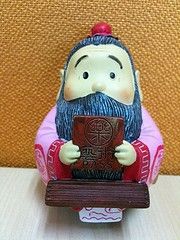
What Does Confucius Say Makes this All Work?
Now, these relationships structure society but, to make them work, people need to know where they stand. People need to understand the system of relationships, as they encounter them in the world around them. To do that, to make it easier to enact relationships properly, Confucius relies on ritual. He sees ritual as central to the day to day operations or implementation of this order of relationships. Ritual can be anything. It can be something very simple... when two people meet on the street in our society, they shake hands. That action of shaking hands is a ritual gesture. It's a gesture which, in our system, indicates "Hi, we're on a level of equality... we're on a level of mutual interaction here".
Image: bfishadow, flickr
Or, a ritual can be something very elaborate... a college graduation or a Presidential inauguration, something that involves large numbers of people performing certain actions in certain ways, with music, colourful uniforms or costumes. Ritual can be very elaborate or very simple, or anywhere in between, but ritual serves to facilitate the enactment of relationships that Confucius suggests are central to a well functioning society. 9When you have faults, do not fear to abandon them ~ Confucius
Does Confucius Have Solutions to These Issues?
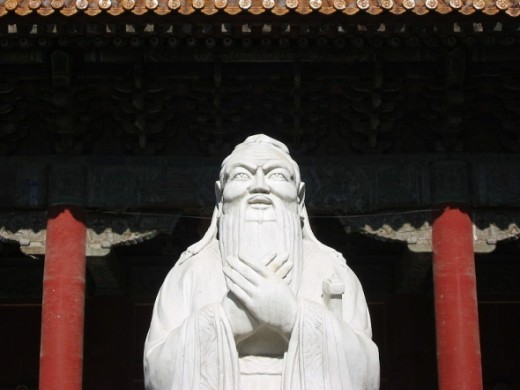
In looking back at history and looking back on China during the Warring States Period, what Confucius says is "This is the key. This is where things went wrong. Things went wrong in China when people violated the proper ritual order. Ritual structures the way that we interact. Ritual marks the relationships of a properly ordered society". So he looks back and he says "When people started taking for themselves the title of King, when people started performing at their local courts the rituals of royalty, when people started wearing the garments of the Zhou Kings, they violated the proper ritual. They broke with the 'right way' of ordering society". All the chaos, all the warfare, all the suffering that has been afflicting China stems from that violation of the ritual order.
And so for Confucius, the initial actions, the basic program that he advocates on how to fix things, he talks about returning to the rites, returning to the ritual order of the early Zhou. Not necessarily in terms of going back and determining what colour robes they wore in the year 1,000 BCE or something like that, but returning to the properly ordered ritual system which was characteristic of the early Zhou, rather than the chaotic order/ lack of order/ chaotic disorder of the Warring States Period.
He also advocates something which called 'the rectification of names'. At one point Confucius was asked "What would you do if you were given power?" He had, of course, had gone around looking to be an advisor to a ruler and one of his students asked this question. And he says "The first thing I would do would be to rectify names. To make the names fit reality". And this is, of course, a reference to the usurpation of the title of "King" by the first of the hegemons back in the 8th Century. They should have stuck with their proper titles. If everyone used the proper terminology, then the world would be a properly ordered place. So ritual order, linguistic order, human relationships understood and properly defined, everyone acting out the role in which they belonged, this would lead to a properly ordered society for China. 10
The firm, the enduring, the simple, and the modest are near to virtue ~ Confucius
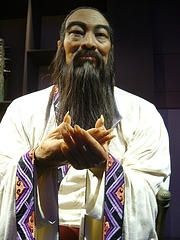
Is Confucius a Role Model For These Solutions?
A critical individual in this process is, what Confucius calls, 'the gentleman' in Chinese the 'jun zi'. The gentleman is the individual who acts as a model. He models the correct behaviour. He models the proper ritual order in himself. He engages in learning, he learns about the past, he is obviously an educated gentleman, a member of the "Shi" elite, and he seeks to approach 'the proper way' (the "Dao"). The Dao literally means "a path", "a walkway", but it means the way of proper order, the way that we should live in the world about us. By promoting and seeking to manifest a proper order by seeking to embody "the way', the gentleman provides an ideal role model that everyone else can learn from and emulate. 11
Image: kafka4prez, flickr
If a man takes no thought about what is distant, he will find sorrow near at hand ~ Confucius
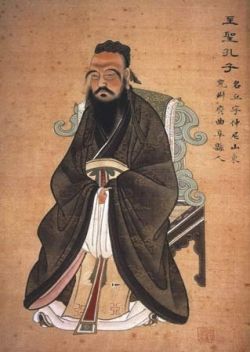
Personal & governmental morality - The principle that, in order to govern others, one must first govern oneself.
Correctness of social relationships - Social harmony results from people knowing their place, and playing it well.
Justice - This results from people who cultivate themselves morally, show filial piety, loyalty, and cultivate humanity/ benevolence.
Sincerity - Obeying ritual with sincerity makes ritual the most powerful way to cultivate oneself.
Image of Confucius: | Public Domain
Great Confucius (Kong Qiu) books from Amazon
Now, what do you think of Confucius (Kong Qiu)?
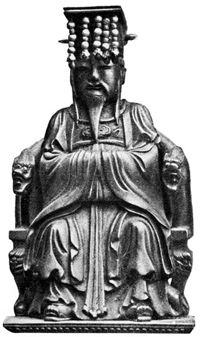
Most of us have heard of him, but what do you REALLY think?
Did you enjoy reading about the kong Qiu (Confucius)? Leave your comments and questions below and note that, although html code is allowed in your comments, spam will be deleted. Please take the time to rate this lens a "thumbs up" at the top LH corner of the page. If you enjoyed it, you may care to mark it as a favourite as well. Not a Squidoo member yet? You're missing out on all the fun. Squidoo is free to join and use, and you can even make some money for your favourite charity, our even for yourself (gasp). Go ahead, make my day and make your first lens now.
Image: Greekgeek

Footnotes
1 Confucius ~ Wikipedia, the free encyclopaedia
2 From Yao to Mao: 5000 Years of Chinese History, Lecture 5 - "Confucianism and Daoism" ~ Professor Kenneth J. Hammond, B.A., A.M., Ph.D. Associate Professor of History, (Head of History Department, New Mexico State University)
3-11 Ibid.


